
January 15
1916 Genocide: From Talaat Pasha's Official Orders Regarding the Armenian Massacres:
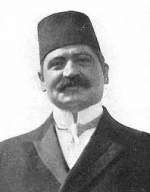
We are informed that certain orphanages which have opened also admitted the children of the Armenians. Should this be done through ignorance of our real purpose, or because of contempt of it, the Government will view the feeding of such children or any effort to prolong their lives as an act completely opposite to its purpose, since it regards the survival of these children as detrimental. I recommend the orphanages not to receive such children; and no attempts are to be made to establish special orphanages for them. [See: The Armenian Genocide.]
1919 Rebel leaders are murdered in failed coup in Berlin:
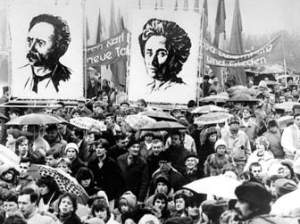
A coup launched in Berlin by a group of radical socialist revolutionaries is brutally suppressed by right-wing paramilitary units from January 10 to January 15, 1919; the group's leaders, Karl Liebknecht and Rosa Luxemburg, are murdered.
Germany's long, ultimately losing struggle on the battlefield—culminating in the signing of the armistice in November 1918—and dismal conditions on the home front, including severe food shortages, caused many German socialists to turn away from the Social Democratic Party, which had supported the war effort in 1914 in the hopes that reform would follow a German victory. Although still the largest party in the Reichstag government, the Social Democrats saw their membership fall from over a million in 1914 to a quarter of that number in 1917.
By that time, a minority had broken off from the party and formed their own, the Independent Socialist Party. Luxemburg and Liebknecht led the Spartacists, the Marxist, revolutionary core group of the new party, which held firmly to the belief that German participation in a war was only justified in the case of a purely defensive conflict. In 1916, Luxemburg—under the nom de guerre Junius—had published a treatise in which she denied that the Great War was defensive for Germany, claiming instead that it was driven by imperialist, capitalist interests. Social democracy had failed the German working class, Luxemburg claimed, and the only solution was international class revolution, such as that envisioned by Vladimir Lenin and begun by the Bolsheviks in Russia in 1917.
On January 6, 1919, just weeks before the peace conference that would determine Germany's future opened in Paris, the Spartacists gathered in Berlin to begin a revolution. Luxemburg urged her followers not to attempt a coup before they mustered sufficient popular support, but she was unable to restrain them. The rebels launched their attacks on January 10. In the conflict that ensued, both Luxemburg and Liebknecht were captured and killed. Her body, thrown into a canal, was not retrieved until five months later. (History.com)
1930 Weimar: Communist riots take place in German industrial centers on account of two million unemployed.
1932 Weimar: Unemployment reaches approximately six million in Germany. [See: Fall of the Weimar Republic.]
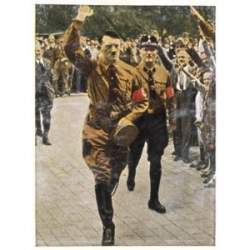
1933 Weimar: Lippe-Detmold: As Goebbels, Goering, Wilhelm Frick, and others propagandize the voters, the Nazis let out all the stops in an election in this small (175,000 population) German State. Hitler himself speaks 17 times in 11 days and the results will be good enough to strengthen Hitler's position in the struggle for power, mediated by Franz von Papen.
1934 Holocaust: Various:
Munich: An anti-Semitic racial exhibition opens.
Nazi Germany: Goering orders the Gestapo to arrest and question all political emigres and Jews returning to Germany. Goebbels demands that all Jews representing German companies abroad be dismissed from their positions. (THP)
1935 Moscow Centre: Grigori Zinoviev and 18 other members are tried in Leningrad for their part in the assassination of Sergei Kirov, secretary of the party committee.
1936 Countdown to Infamy: Japan withdraws from the London Naval Conference after being denied equality.
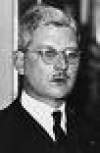
1937 Austria: The Schuschnigg government proclaims amnesty for Austrian Nazis. [See: Austria: The Other Germany.]
1940 World War II: Various:
War at Sea: A German U-boat torpedoes a Dutch trade ship Arendskerk (Eagle's Church).
Belgium: The government refuses to let England and France move troops into Belgium before a possible German attack. This is a strange response as the captured German invasion plans called for an attack through Belgium.

1941 World War II: Hitler meets with Antonescu at Salzburg and informs him of his intention to invade Russia with Romanian collaboration. Antonescu tells Hitler that first he must liquidate the Legionary Movement, but neglects to ask for more than just a promise of additional aid, armaments, and war materials.
1943 World War II: Various:
Chemical warfare: The American army agrees to co-fund an anthrax-producing site at Grosse Ile, Quebec, Canada.

The Pentagon: The world's largest office building is completed, just outside of Washington, DC, in Arlington, Virginia. The massive structure covers 34 acres of land and has 17 miles of corridors, and serves as the headquarters of the United States defense effort. It took 1,000 workers to install the air conditioning system alone for the project, which was completed under the direction of General Leslie Groves. Note: Groves was also director of the Manhattan Project.
War in the Pacific: The Japanese are driven off Guadalcanal. [See: Guadalcanal Diary.]
1944 World War II: Various:
The European Advisory Commission makes plans to divide postwar Germany.

General Eisenhower arrives in England.
1945 World War II: Various:
Netherlands: Every inhabitant of Amsterdam receives 3 kg of sugar beets.
World War II: The Red Army invades East Prussia.
1946 Nuremberg Tribunal: Day 34:
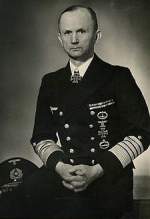
Continuation of Col. Phillimore's Presentation of the Case Against Karl Doenitz.
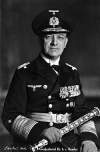
Major F. Elwyn Jones' Presentation of the Case Against Erich Raeder.
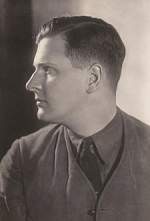
Beginning of Capt. Drexel A. Sprecher's Presentation of the Case Against Baldur von Schirach.
Karl Heinz Moehle, Korvettenkapitan in the German Navy, testifies for the Prosecution:It [a U-boat in the outer Bay of Biscay] was sailing on patrol when it sighted a rubber dinghy carrying survivors of a British plane. The fact that it was on an outgoing mission, that is, being fully equipped, made it impossible to take the crew of the plane on board, although, especially at that time, it appeared especially desirable to bring back specialists in navigation from shotdown aircraft crews to get useful information from them. The commander of the U-boat made a wide circle around this rubber boat and continued on his mission. When he returned from his mission he reported this case to the staff of the Commander-in-Chief of U-boats. The staff officers reproached him, saying that, if he were unable to bring these navigation specialists back with him, the right thing to do would have been to attack that crew, for it was to be expected that, in less than 24 hours at the latest, the dinghy would be rescued by British reconnaissance forces. [For further details, Click here.]
1950 Death: Henry (Hap) Arnold, US Army Air Force general during World War II:
Arnold was devoted to his troops and spent much of the war touring overseas operations. He worked extremely hard and his health suffered for it. He had his first of several heart attacks on January 19, 1945, less than a month after his promotion to five-star General of the Army. His doctors and family encouraged him to retire, but he felt duty-bound to finish the war and bring his flyers home. He finally retired in June 1946, and one year later the U.S. Air Force was founded as a separate service. In 1949, President Truman signed a bill making Arnold a permanent (and in 2001, the only) General of the Air Force. He died the following January in his sleep. [For further details, Click here.]
1951 The "Witch of Buchenwald" is sentenced to prison:

On this day, Ilse Koch, wife of the commandant of the Buchenwald concentration camp, is sentenced to life imprisonment in a court in West Germany. Ilse Koch was nicknamed the "Witch of Buchenwald" for her extraordinary sadism.
Born in Dresden, Germany, Ilse, a librarian, married SS. Col. Karl Koch in 1936. Colonel Koch, a man with his own reputation for sadism, was the commandant of the Sashsenhausen concentration camp, two miles north of Berlin. He was transferred after three years to Buchenwald concentration camp, 4.5 miles northwest of Weimar; the Buchenwald concentration camp held a total of 20,000 slave laborers during the war.
Ilse, a large woman with red hair, was given free rein in the camp, whipping prisoners with her riding crop as she rode by on her horse, forcing prisoners to have sex with her, and, most horrifying, collecting lampshades, book covers, and gloves made from the skin of tattooed camp prisoners. A German inmate gave the following testimony during the Nuremberg war trials: "All prisoners with tattooing on them were to report to the dispensary . . . After the prisoners had been examined, the ones with the best and most artistic specimens were killed by injections. The corpses were then turned over to the pathological department, where the desired pieces of tattooed skin were detached from the bodies and treated further."
Karl Koch was arrested, ironically enough, by his SS superiors for "having gone too far." It seems he had a penchant for stealing even the belongings of wealthy, well-placed Germans. He was tried and hanged in 1944. Ilse Koch was tried for crimes against humanity at Nuremberg and sentenced to life in prison, but the American military governor of the occupied zone subsequently reduced her sentence to four years. His reason, "lack of evidence," caused a Senate investigation back home. She was released but arrested again, tried by a West German court, and sentenced to life. She committed suicide in 1967 by hanging herself with a bedsheet. (History.com)
1953 Cold War: Dulles calls for "liberation of captive peoples":
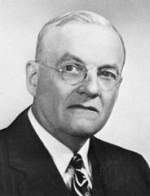
Testifying before the Senate Foreign Relations Committee prior to taking office as the new secretary of state, John Foster Dulles argues that U.S. foreign policy must strive for the "liberation of captive peoples" living under communist rule.
Though Dulles called for a more vigorous anticommunist policy, he remained vague about exactly how the "liberation" would take place. When asked during the hearing whether he supported the policy of containment, which sought to restrain the further expansion of communist power, Dulles responded by declaring, "We shall never have a secure peace or a happy world so long as Soviet communism dominates one-third of all of the peoples."
Despite the vague specifics of the original declaration, Dulles's call for action was soon put into practice. The Eisenhower administration conceived a wide-ranging program of political and psychological warfare, and overseas propaganda—produced and disseminated by the new United States Information Agency—became an important Cold War weapon. In Iran, Guatemala, and later, Cuba, the United States resorted to covert operations directed by the Central Intelligence Agency to destabilize foreign governments perceived to be a communist threat.
In 1956, however, Dulles's oft-repeated calls for the liberation of captive peoples backfired badly when Hungarian citizens rose up in revolt against the Soviet presence in their country. As the Russians crushed the uprising, the United States did nothing while Hungarian rebels pleaded helplessly for assistance. (History.com)
1955 Peace: The USSR officially ends the state of war with the German Federal Republic.
1962 Vietnam War: Kennedy says U.S. troops are not fighting:
Asked at a news conference if U.S. troops are fighting in Vietnam, President Kennedy answers "No." He was technically correct, but U.S. soldiers were serving as combat advisers with the South Vietnamese army, and U.S. pilots were flying missions with the South Vietnamese Air Force. While acting in this advisory capacity, some soldiers invariably got wounded, and press correspondents based in Saigon were beginning to see casualties from the "support" missions and ask questions. (History.com)
1973 Nixon suspends military action in North Vietnam: President Richard M. Nixon suspends military action in North Vietnam on this day in 1973, giving peace talks between his secretary of state, Henry Kissinger, and North Vietnamese leader Le Duc Tho a chance to succeed. [For further information, click here]
1992 Balkans: The Yugoslav federation effectively collapses as the European Community recognized the republics of Croatia and Slovenia.
Edited by Levi Bookin (Copy editor)
levi.bookin@gmail.com
FAIR USE NOTICE: This site may contain copyrighted material the use of which has not always been specifically authorized by the copyright owner. We are making such material available in our efforts to advance understanding of historical, political, human rights, economic, democracy, scientific, environmental, and social justice issues, etc. We believe this constitutes a 'fair use' of any such copyrighted material as provided for in section 107 of the US Copyright Law. In accordance with Title 17 U.S.C. Section 107, the material on this site is distributed without profit to those who have expressed a prior interest in receiving the included information for research and educational purposes. If you wish to use copyrighted material from this site for purposes of your own that go beyond 'fair use', you must obtain permission from the copyright owner.
Please note that the list-owner and the moderators are not responsible for, and do not necessarily approve of, the random ads placed on our pages by our web server. They are, unfortunately, the price one pays for a 'free' website.